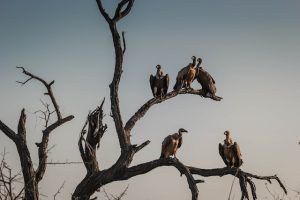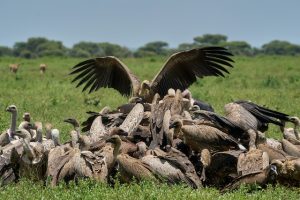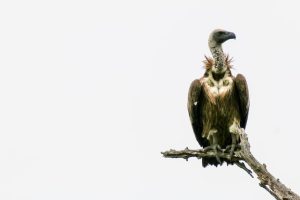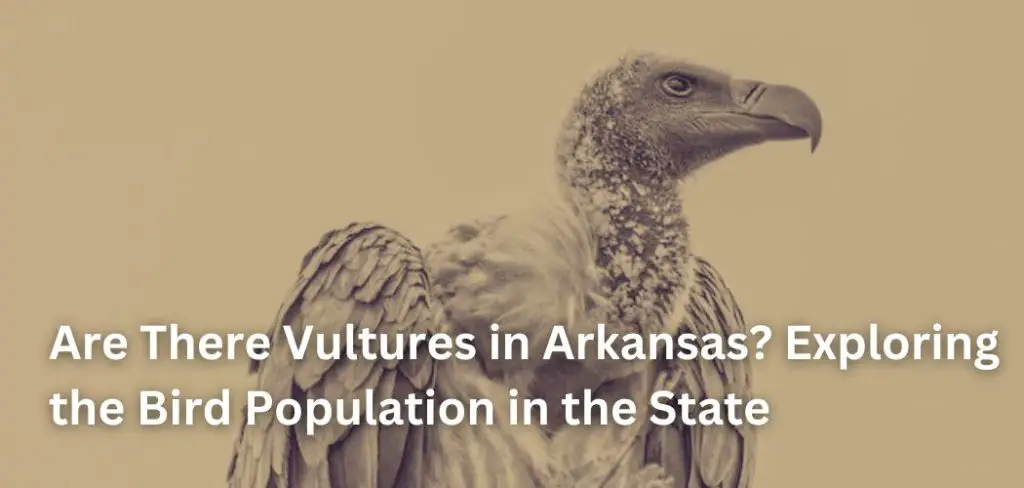Vultures are fascinating birds that have long been associated with death and decay. They are scavengers that feed on carrion, and their distinctive bald heads and hooked beaks make them easy to identify.
However, not all parts of the world are home to these birds, and some people may wonder if vultures can be found in Arkansas.
Arkansas is a state located in the southern region of the United States. It is known for its diverse landscapes, ranging from the Ozark and Ouachita Mountains to the Mississippi Delta.
While there are many different types of birds that call Arkansas home, some people may be surprised to learn that there are vultures in the state.
In fact, two species of vultures can be found in Arkansas: the turkey vulture and the black vulture.
Despite their somewhat ominous reputation, vultures play an important role in maintaining healthy ecosystems.
They help to clean up dead animals and prevent the spread of disease.
While they may not be the most glamorous birds, they are certainly fascinating creatures that are worth learning more about.
Vultures in Arkansas
Arkansas is home to two species of vultures: the turkey vulture and the black vulture. Both species can be found throughout the state, although their populations may be more concentrated in certain areas.
Residents of northwest Arkansas may be more likely to encounter vultures, as this region is known to have a higher population of birds.
However, vultures can be found throughout the state, and are often seen soaring overhead or perched on tree branches.
Turkey vultures are easily identified by their large size, dark feathers, and distinctive red, featherless head.
Black vultures, on the other hand, are smaller and have black feathers and a gray head. Both species are scavengers and play an important role in the ecosystem by cleaning up carrion and other dead animals.

While vultures may not be the most glamorous birds, they are an important part of Arkansas’s wildlife. If you do encounter a vulture, it’s best to give the bird plenty of space and avoid disturbing it.
Vultures can be intimidating, but they are not aggressive towards humans and will generally fly away if they feel threatened.
In summary, Arkansas is home to both turkey vultures and black vultures, with populations found throughout the state.
While residents of northwest Arkansas may be more likely to encounter vultures, both species can be seen soaring overhead or perched on tree branches throughout the state.
Types of Vultures
Vultures are large birds of prey that feed on carrion. There are two types of vultures found in Arkansas, the Turkey Vulture and the Black Vulture.
Turkey Vulture
The Turkey Vulture (Cathartes aura) is a large bird with a wingspan of up to six feet. They have a bald, red head and a dark, feathered body. Turkey Vultures have a keen sense of smell which they use to locate carrion. They are often seen soaring in circles high in the sky, using thermals to stay aloft.
Turkey Vultures are an important part of the ecosystem, as they help to clean up dead animals. They are also protected under the Migratory Bird Treaty Act, which makes it illegal to harm or kill them.
Black Vulture
The Black Vulture (Coragyps atratus) is a slightly smaller bird than the Turkey Vulture, with a wingspan of up to five feet. They have a black, feathered body and a bald, gray head. Unlike the Turkey Vulture, Black Vultures do not have a keen sense of smell and rely on their eyesight to locate carrion.
Black Vultures are often seen in groups, called committees, and are known for their aggressive behavior. They will often chase away other birds of prey from carrion and will even attack live animals if they are weak or injured.
Both Turkey Vultures and Black Vultures are commonly referred to as buzzards, although this term is technically incorrect. In fact, true buzzards are a type of hawk found in Europe and Asia.
In Arkansas, both Turkey Vultures and Black Vultures are a common sight, especially in rural areas. While they may not be the most attractive birds, they play an important role in maintaining the balance of nature.
Habitat and Range
Vultures are a common sight in many parts of North America, including Arkansas. These scavengers are often found in habitats that provide ample food sources, such as forests, grasslands, and wetlands. While vultures are adaptable birds, they do have specific habitat preferences that allow them to thrive.
Forests and Woodlands
In Arkansas, vultures can be found in forested areas such as the Ozarks. These birds prefer to nest in trees, and old-growth forests provide the ideal nesting habitat. Vultures are known to use the same nesting site year after year, so protecting these areas is important for their long-term survival.
Open Areas and Grasslands
Vultures are also found in open areas and grasslands, where they can easily locate and feed on carrion. These birds are often seen in agricultural areas, where they can feed on the remains of livestock. In Arkansas, vultures can be found in grasslands and prairies, as well as in agricultural areas.
Wetlands and Riversides
Wetlands and riversides are also important habitats for vultures. These areas provide a source of water and attract a variety of animals, making them ideal locations for scavengers. In Arkansas, vultures can be found near wetlands and riversides, where they feed on fish and other aquatic animals.
Overall, vultures have a wide range across North America, and can be found in a variety of habitats. While they are adaptable birds, they do have specific habitat preferences that allow them to thrive. Protecting these habitats is important for the long-term survival of vultures in Arkansas and other southern states.
Behavior and Characteristics
Flight and Soaring
Vultures are known for their impressive flight abilities. They are able to soar for hours without flapping their wings, using thermals to gain altitude and glide effortlessly. They have a wingspan of up to six feet and can reach speeds of up to 60 miles per hour. Vultures are often seen circling high in the sky, scanning the ground for potential food sources.
Roosting and Nesting
Vultures are social birds and often roost and nest in large communal groups. They prefer to nest in high places, such as cliffs or tall trees. Vultures do not build nests but instead lay their eggs directly on the ground or in a shallow depression. Both parents take turns incubating the eggs and caring for the young.
Feeding Habits
Vultures are scavengers and feed primarily on carrion, or dead animals. They have a unique digestive system that allows them to consume and digest decaying meat without getting sick. Vultures play an important role in the ecosystem by cleaning up and disposing of dead animals, which helps to prevent the spread of disease.
Sense of Smell
Contrary to popular belief, vultures do not have a highly developed sense of smell. Instead, they rely on their keen eyesight to locate food from high in the sky. They are able to spot even small carcasses from great distances and can quickly descend to the ground to feed.

Overall, vultures are fascinating birds with unique behaviors and characteristics. Despite their unsavory reputation, they play an important role in the ecosystem and should be appreciated for their valuable contributions.
Interaction with Humans
Vultures have a unique role in the ecosystem as scavengers, but their interactions with humans can sometimes lead to conflicts. In Arkansas, the two species of vultures that are commonly found are Turkey Vultures (Cathartes aura) and Black Vultures (Coragyps atratus). People’s views towards vultures are influenced by the abundance of these birds and their interactions with humans.
Livestock and Farming
Vultures can pose a threat to livestock, particularly newborn calves, lambs, and sheep. Livestock owners have reported instances of vultures attacking and killing their animals. The Arkansas Farm Bureau recommends that farmers take measures to protect their livestock, such as using effigies, lights, or signs to deter vultures from feeding on their property.
Permit and Protection
Vultures are protected under the Migratory Bird Treaty Act and are considered a protected species in Arkansas. It is illegal to harm or kill vultures without a permit. However, the Livestock Indemnity Program provides financial assistance to livestock owners who have suffered losses due to vulture predation.
Control and Deterrence
There are several methods that can be used to control and deter vultures from feeding on livestock or property. One method is to make noise or use scare tactics to frighten them away. Another method is to use control measures such as effigies, lights, or signs to deter vultures from feeding on the property. It is important to note that these methods must be used in accordance with the law and with consideration for the welfare of the birds.
In summary, while vultures play an important role in the ecosystem, their interactions with humans can sometimes lead to conflicts, particularly in the context of livestock and farming. Livestock owners can take measures to protect their animals, while also adhering to the laws that protect vultures as a species.
Research and Observation
Arkansas is home to a diverse range of bird species, including vultures. The Christmas Bird Count, a nationwide bird census conducted annually by volunteers, has recorded sightings of both turkey vultures and black vultures in the state.
The deer population in Arkansas has been observed to have an impact on vulture populations. Vultures feed on carrion, and a decrease in the deer population can lead to a decrease in the availability of carrion for vultures to feed on.
Droppings left by vultures can also provide insight into their presence in the state. The National Wildlife Research Center has conducted studies on vulture droppings to determine their diet and range.

The Cornell Lab of Ornithology has also conducted research on vultures in Arkansas. In a study on the behavior and ecology of turkey vultures, researchers found that vultures in the state roosted in large groups and preferred to feed on carrion near water sources.
Joe Neal, a professor of biological sciences at Arkansas State University, has also conducted research on vultures in the state. In a study on the impact of vulture removal on the spread of disease, Neal found that vultures played an important role in preventing the spread of disease by consuming carrion infected with bacteria.
Overall, research and observation indicate that vultures can be found in Arkansas and play an important role in the ecosystem by consuming carrion and preventing the spread of disease.
